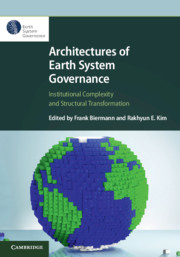Book contents
- Architectures of Earth System Governance
- Series page
- Architectures of Earth System Governance
- Copyright page
- Contents
- Contributors
- Acknowledgements
- 1 Architectures of Earth System Governance
- Part I The Building Blocks
- Part II Core Structural Features
- Part III Policy Responses
- 9 Policy Integration
- 10 Interplay Management
- 11 Orchestration
- 12 Governance through Global Goals
- 13 Hierarchization
- Part IV Future Directions
- Glossary
- Index
- References
11 - Orchestration
from Part III - Policy Responses
Published online by Cambridge University Press: 17 April 2020
- Architectures of Earth System Governance
- Series page
- Architectures of Earth System Governance
- Copyright page
- Contents
- Contributors
- Acknowledgements
- 1 Architectures of Earth System Governance
- Part I The Building Blocks
- Part II Core Structural Features
- Part III Policy Responses
- 9 Policy Integration
- 10 Interplay Management
- 11 Orchestration
- 12 Governance through Global Goals
- 13 Hierarchization
- Part IV Future Directions
- Glossary
- Index
- References
Summary
Orchestration is a soft mode of governance, in which a ‘governor’ enlists the voluntary cooperation of intermediary actors to carry out governance functions that further the governor’s goals. Environmental issues figured prominently in the origin of the orchestration concept, and orchestration has since played a significant role in earth system governance research on architecture and agency. This chapter summarizes key empirical findings of this research, especially on sustainable development and climate change. It also identifies contributions of earth system governance research to orchestration theory: for example, concerning the conditions for successful orchestration, the role of orchestration platforms and orchestration’s role in institutional complexity. The chapter then engages with critiques and normative concerns, particularly relating to power, accountability and legitimacy. The chapter concludes with thoughts on an orchestration research agenda that can support the transformative goals of the new earth system governance science plan.
Keywords
- Type
- Chapter
- Information
- Architectures of Earth System GovernanceInstitutional Complexity and Structural Transformation, pp. 233 - 253Publisher: Cambridge University PressPrint publication year: 2020
References
- 8
- Cited by

